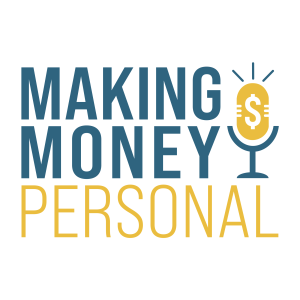Episodes

Tuesday Apr 15, 2025
Tips to Combat Overconsumption - Money Tip Tuesday
Tuesday Apr 15, 2025
Tuesday Apr 15, 2025
Today, overconsumption has grown pervasively in many of our lives. Or at least the temptation to overconsume. In this time of influencers, shopping hauls, and restocking videos, it's important to remember the effects that overconsumption can have on not only our lives but also the lives of others and, ultimately, the environment.
If you're hoping to combat overconsumption habits in your own life, there are ways to recognize and bar yourself against the habit, leading to a more fulfilling and mindful lifestyle.
Links:
Check out TCU University for financial education tips and resources!
Follow us on Facebook, Instagram and Twitter!
Learn more about Triangle Credit Union
Transcript:
Welcome to Money Tip Tuesday from the Making Money Personal podcast.
What is overconsumption? Overconsumption happens when we buy more stuff than we need. If you're perpetually on the internet like I am, you've probably seen restock videos, unboxing videos, shopping hauls, and influencer must-haves. These are items that influencers, who have a large following on social media, often promote as essential or trendy, leading their followers to believe they need these items too. More often than not, these videos showcase extraordinary purchases to show off their collections or entice you to buy the item presented. They're almost always aesthetically pleasing and show off in carefully crafted ways to get viewers to picture themselves owning or using the item.
But this is all part of the vast overconsumption environment we're in.
You may know what I'm talking about, as some signs in your home may point to this phenomenon. An overflowing closet, overstuffed drawers, and piles of things littering the hallway are all examples of what can happen when we overbuy. Recognizing these signs is the first step towards a more mindful and sustainable lifestyle.
Some common signs of overconsumption are buying clothes you'll only wear once, wasting food because of overbuying, upgrading your phone too often, and using too much energy at home.
We're fortunate to live in a time when almost anything we want can be delivered to our doors within a couple of days. The convenience of online selling and delivery apps has given us many wonderful opportunities to live and build the lives we want, but they also give us more reasons to shop and spend.
Not to mention the barrage of advertisements on social apps, streaming services, influencer videos, and targeted emails constantly reminding us of that nifty new gadget, skincare product, or clothing item. Plus, payment options like 'Buy Now, Pay Later' (BNPL) have entered the arena, allowing even more people to purchase items they would otherwise have had to wait for or passed on altogether.
To better identify the effect of overconsumption on society, it's essential to recognize its dangers.
From an Individual perspective, overconsumption can negatively affect our finances due to increased spending on things that we either never use or use once and then discard. Not to mention, if you're one to stockpile, a buildup of items can lead to a cluttered living space, inhibiting our ability to feel at peace or relaxed in our homes.
The dangers of overconsumption affect not only you but also your environment. Overbuying can lead to greater waste and an increase in items sent to landfills. More trash can lead to more pollution, which affects our environment.
What's the best method of avoiding overconsumption? First, be honest with yourself and recognize if you're doing it. Then, pay attention to the signs in and around your home and your spending transactions to check your consumption habits.
It's also good to start being more mindful about why you're buying something in the first place.
You can also try an underconsumption challenge. You may have seen people online touting their own underconsumption journeys also known as “underconsumption core”. These are lifestyle changes where they focus on not buying more things than they’ll use or need. Some examples you may see range from people using all existing skincare products before buying anything new, learning how to mend their own clothes instead of tossing used and buying new ones, or trying to make dinner from whatever is available in the fridge rather than running to the store for more ingredients or ordering out. For instance, you could try a 'no-buy month' where you commit to not purchasing any non-essential items for a month. Or, you could challenge yourself to use up all the food in your pantry before buying more groceries. Some of these ideas work as lifestyle habits; others might be fun to try as challenges. Reflect on your situation and determine whether you would benefit from some underconsumption habits to live a more sustainable life.
If there are any other tips or topics you would like us to cover, let us know at tcupodcast@trianglecu.org. Like and follow our Making Money Personal FB and IG page and look for our sponsor, Triangle Credit Union on social media to share your thoughts.
Thanks for listening to today’s Money Tip Tuesday and check out our other tips and episodes on the Making Money Personal podcast.
Have a great day!

Tuesday Apr 08, 2025
Understanding The Risks of Gambling - Money Tip Tuesday
Tuesday Apr 08, 2025
Tuesday Apr 08, 2025
In today's media, it is impossible not to see an ad for the latest gambling service. If you don't already know, gambling is risking money or something of value on an event with an unknown outcome and can be done both online and in-person, on anything from slot machines to a sports game. While it may seem fun to win some money on something, gambling comes with a bunch of risks, and it's not just losing money.
Links:
If you or someone you know might struggle with gambling visit https://www.nhproblemgambling.org/ for information and resources
Explore psychology resources and therapy services on Psychology Today's website
Explore Gamblers Anonymous website for resources and services
Check out TCU University for financial education tips and resources!
Follow us on Facebook, Instagram and Twitter!
Learn more about Triangle Credit Union
Transcript:
Welcome to Money Tip Tuesday from the Making Money Personal podcast.
If you decide to gamble, it is very important to gamble safely. Before you try your luck, consider setting some guidelines to stick to. Limit how much you want to gamble, and don't exceed that limit. If you have the unfortunate experience of losing all the money you set aside to gamble, walk away. Don't put any more money down to chase a win. If you decide to gamble, keep it in a social setting with supportive friends who can help you stick to your plan. Also, try to avoid excessive alcohol and drug use while gambling, as that might influence you to make rash decisions and gamble more.
While most people who have placed a bet have done so without problems, some have gone on to develop a gambling addiction. The Diagnostic and Statistical Manual of Mental Disorders, 5th edition, which is a diagnostic tool published by the American Psychiatric Association, classifies gambling problems as an addictive disorder. Similarly to drugs and alcohol, a gambling addiction involves an increased tolerance that results in the feeling of gambling even more to feel satisfied. People with a gambling addiction who try to quit will go through similar withdrawal symptoms, such as an urge to gamble and irritability.
With unchecked gambling issues, it can quickly turn from a fun way to win or lose money to costing you a fortune, going into debt, mental health issues, and even bringing harm to your friends and family. The first part is obvious: the more you gamble, the more likely you will lose more and more money. Watching your finances go down the drain will impact your mental health. Often when this happens, a gambling addict will keep going back in an attempt to win their money back. This spiraling behavior can strain your loved ones, especially your family or people who might rely on you.
An estimated 0.4% to 2% of the world's population has a gambling addiction. You are more likely to develop a gambling addiction if you have any other addictions or have a psychiatric condition. For example, an estimated 4% of people treated for substance abuse also have a gambling addiction. A lower income is also linked to having a gambling addiction, as people are looking for a big win to give them a step up.
If you believe you may have a gambling problem or addiction, there are options to help you. Going to therapy is a significant first step. Many therapists are knowledgeable about gambling addictions and trained to help you overcome them. You can visit psychologytoday.com to find the right therapist for you. There are also support groups like Gamblers Anonymous, where you can talk to other people with gambling problems and share experiences.
Gambling can be fun, but it's risky. Please play responsibly.
If there are any other tips or topics you'd like us to cover, let us know at tcupodcast@trianglecu.org. Also, remember to like and follow our Making Money Personal Facebook and Instagram to share your thoughts. Finally, remember to look for our sponsor, Triangle Credit Union, on Facebook and LinkedIn.
Thanks for listening to today's Money Tip Tuesday. Check out our other tips and episodes on the Making Money Personal podcast.

Thursday Apr 03, 2025
Thursday Apr 03, 2025
Understanding financial aid and student loans is crucial for anyone planning to fund higher education, whether you're a student, parent or even an educator, having someone available to help you navigate the complexities of funding higher education is essential.
In this episode, we're chatting with Shawn Kithcart-Bulk, Education Funding Specialist at Granite Edvance, about the different types of financial aid available, how to apply for them, and what you need to know about managing your student loans.
Links:
Learn more about Granite Edvance's resources and opportunities
Contact Granite Edvance to get in touch with a counselor or other staff
Explore Upcoming Events for college planning and funding webinars
Check out TCU University for financial education tips and resources!
Follow us on Facebook, Instagram and Twitter!
Learn more about Triangle Credit Union

Tuesday Apr 01, 2025
Get Valuable Insights into Your Credit with Better Checking - Money Tip Tuesday
Tuesday Apr 01, 2025
Tuesday Apr 01, 2025
Your credit score is an important factor in your financial journey as it represents your potential risk of repaying your loans to lenders and creditors. Your credit score may also impact loan interest rates and term lengths which is why it’s crucial to be aware of your credit score and any changes that may occur.
Links:
Learn more about the benefits of a Better Checking account
Access your better checking benefits through the Better Checking website
Check out TCU University for financial education tips and resources!
Follow us on Facebook, Instagram and Twitter!
Learn more about Triangle Credit Union
Transcript:
Welcome to Money Tip Tuesday from the Making Money Personal podcast.
There are five factors to how your credit is scored – payment history, balances owed, age of credit, credit mix, and recent activity. Payment history and balances owed have the largest impact on your score. Credit score ranges may vary based on the credit bureau’s scoring model, however they are similar to:
300-579: Poor
580-669: Fair
670-739: Good
740-799: Very good
800-850: Excellent
The higher your credit score, the better rate you will get and the lower your payment will be. Your credit score can also influence your approval rate for many other things besides loans. It can determine if you get approved for a credit card and how much you get approved for. Property owners look at credit scores to decide who they want to rent to. Insurance premiums can also go up if your credit score is low. Valuable Insights into Your Credit with Better Checking Now that you know how your credit score works and why it matters, let’s focus on some benefits you get with your Triangle Credit Union Better Checking account.
Credit Score Tracking
Receive valuable insights into your credit score and see your score plotted monthly in a chart so you can easily see your changes over time. Your credit score is analyzed with different factors by TransUnion—total of all account revolving balances, real estate information, oldest account, loan balances, recent account delinquencies, and derogatory payment status. You can also receive monthly notifications right to your email to easily track your score.
Credit Report
Your personal credit report contains details about your financial behavior and identification information. Each credit reporting agency collects and organizes data about your credit history from your creditors and public records. Reviewing your credit report allows you to check for mistakes or fraud and it’s a good way for you to understand what lenders see when they check your credit history.
Credit File Monitoring
Credit File Monitoring consistently reviews your credit history in order to detect any key changes and verify the accuracy of what is reported. With IDProtect, you have access to credit file monitoring – your credit report will be checked daily and you will be notified by email when key changes or important activity related to your credit report are detected, such as: credit inquiries, public records, delinquencies, negative information, employment changes, new accounts opened. Alerts may also be sent directly to your mobile phone via text and can be set up on our dedicated Better Checking website.
In addition to credit score tracking and identity theft protection, your Triangle Credit Union Better Checking account also offers enhanced cell phone protection for up to four phones on your account—up to $400 per claim! Visit our checking account page to learn more and open an account today!

Tuesday Mar 25, 2025
Financial Book Review: The Psychology of Money - Money Tip Tuesday
Tuesday Mar 25, 2025
Tuesday Mar 25, 2025
What do you think has more impact on your financial decisions, your income or your mindset? Would you believe that how you view and think about money matters more than how much money you make? If you’re striving for financial success and want some insight into how your thinking impacts your probability of building wealth, then I have a book for you!
Links:
The Psychology of Money by Morgan Housel
Check out TCU University for financial education tips and resources!
Follow us on Facebook, Instagram and Twitter!
Learn more about Triangle Credit Union
Transcript:
Welcome to Money Tip Tuesday from the Making Money Personal podcast.
Financial education can come from so many places. Lessons can be learned through experience, observing the actions of others, formal education or exploring resources across the internet. For those who like to learn through reading, one financial book you should read is called The Psychology of Money by Morgan Housel.
I really enjoyed this book. I found it really easy to understand and relatable.
This book was written to explain away the notion that only highly intelligent people of great means can be successful and to make specific points on how mindset and behavior impact our ability to build and maintain wealth.
Originally written in 2018 as a short report, the content was later expanded on and published as a book. It’s not a long read as Housel’s choice was to make book of smaller, shorter points that someone would finish reading than one long one they wouldn’t.
The book starts off with lessons from the lives of two men. One who was incredibly wealthy, loved to show it but eventually lost it, and another of a man who didn’t appear wealthy but stunned everyone when he left multimillions in inheritance and endowments upon his death. One went broke, the other left a financial legacy. The question these two very different stories raise is “What made the difference in these two people’s lives that led to such contrasting outcomes?”
Housel attempts to answer this question in his book when he states, “doing well with money has a little to do with how smart you are and a lot to do with how you behave.”
The goal for readers is that they’ll apply the principles outlined in the book, to cultivate a healthier relationship with money, make more informed decisions, and ultimately achieve greater financial stability and peace of mind.
Throughout the book, Housel lists up to 20 points on how our psychology around money affects our behavior, but because I don’t have time to go over them all, here are some of the notable points that stood out to me most:
In the book, he mentions how important it is to remember how the decisions people make with their money are tied to their individual experiences with the way the world works. Because those experiences vary widely, such as a child growing up in poverty versus another raised in luxury, the financial behaviors of one would seem completely foreign to the other. Housel states, “what looks crazy to you might make sense to me. But no one is crazy – we all make decisions based on our own unique experiences that seem to make sense to us in a given moment.” I felt that this point is serves as a good reminder that there should be no expectation that everyone will have the exact same behavior around money, as they’re not all influenced by the same experiences. We should be understanding enough to know that poor financial habits or decisions are not due to lack of intelligence, they are more simply due to someone acting on the way they’ve grown to understand the world.
He addresses what can happen when what you have is never enough. The subtitle to this point is when rich people do crazy things. The whole purpose of this point is to emphasize how important it is to know when you have enough, as greed can drive people to do crazy things, and, as he further illustrates, drive rich people to do crazier things. Housel shares stories of a few wealthy individuals, like Bernie Madoff, whose push to accumulate more wealth led to compromising decisions and ultimately jail sentences. I felt this point was a good reminder of how easy, and dangerous, it can be to fall into this mindset. It’s important to recognize the impact and challenges having wealth can have on us like the added pressure from social comparisons, the moving of financial goalposts, and the temptation to take unethical risks in an effort to gain more money.
Another point that stood out to me is his assertion that controlling your time is the highest dividend money pays, in other words, seek freedom. For many people, the desire to be wealthy is rooted in the desire to be happy. The book lists some scientific research showing that there’s a strong correlation between someone’s happiness and their ability to control their own life. He states, “more than your salary. More than the size of your house. More than the prestige of your job. Control over doing what you want, when you want, with the people that you want to, is the broadest variable that makes people happy.” The idea from this point is how important it is to make intentional decisions with your money; decisions that bring you closer to being able to enjoy this freedom. This type of freedom could be anything like having peace during an unexpected job loss, the ability to choose a new job with lower pay but with more flexible hours, or the ability to retire when you want and not when you have to. He shares, “You realize that aligning money towards a life that lets you do what you want, when you want, with who you want, where you want, for as long as you want, has incredible return.” I’ve chosen to apply this point as a personal ethos in my own life because I believe that investing in financial freedom enables a lifestyle that can sustain new opportunities and the true enjoyment of vocations.
As mentioned previously, there are so many more points in the book about building wealth like the importance of compounding yet how it can be confusing to implement, that others are not as impressed with our possessions as we might be and that real wealth is not always obvious and recognizable. If you’re interested in checking them out, get the book. It’s worth the read.
To sum it all up, I’ll use a final quote from the book, "Financial success is not a hard science. It’s a soft skill, where how you behave is more important than what you know." This perspective underscores the book's relevance, highlighting that our actions with money are often driven by emotions, biases, and personal experiences rather than purely rational calculations. By recognizing and addressing these psychological factors, you can better navigate your financial journey and achieve greater financial well-being.
If there are any other tips or topics you would like us to cover, let us know at tcupodcast@trianglecu.org. Like and follow our Making Money Personal FB and IG page and look for our sponsor, Triangle Credit Union on social media to share your thoughts.
Thanks for listening to today’s Money Tip Tuesday and check out our other tips and episodes on the Making Money Personal podcast.
Have a great day!

Tuesday Mar 18, 2025
Tips to Shop Reliable Cars in 2025 - Money Tip Tuesday
Tuesday Mar 18, 2025
Tuesday Mar 18, 2025
Buying a car is a big deal. Unless you live in a walkable area, your car is likely the primary method of transportation used to get around. If so, you’ll want something reliable as well as affordable. Many factors affect the price of vehicles from inflation, chip shortages, supply chain interruptions, and even the possibility of looming tariffs.
At the time of this recording the average new car price is around $48,000 and with a price tag like that, it may be wise to make sure the next car you choose is reliable. But with so many cars to choose from, how do you know which is the best for you? Keep listening to learn what cars should be your next ride.
Links:
Check out the Consumer Report for the Most Reliable Cars for 2025
Shop for a new car with Triangle's AutoSmart tool
Learn more about Mechanical Repair Coverage
Check out TCU University for financial education tips and resources!
Follow us on Facebook, Instagram and Twitter!
Learn more about Triangle Credit Union
Transcript:
Welcome to Money Tip Tuesday from the Making Money Personal podcast.
A good place to start when looking for a reliable vehicle is Consumer Reports. Consumer Reports is a nonprofit organization that unbiasedly tests products with consumers in mind, to educate and inform potential buyers. For this particular report, they asked their members about the variety of car problems they encountered in the past 12 months. As a result, Consumer Reports gathered information on over 300,000 vehicles with model years ranging from 2000 to 2025.
They then looked at problem areas, from minor inconveniences such as squeaky brakes and broken interior trim to major problems like engine or transmission issues. Consumer Reports then used the results to score the reliability of vehicles in all the different areas, with the major problems being weighted more.
According to Consumer Reports’ findings, the top 3 most reliable new car brands for 2025 are Subaru, Lexus, and Toyota. On the other side, the bottom 3 unreliable new car brands turned out to be GMC, Cadillac, and Rivian. For those looking to buy a used car, the top 3 most reliable brands are Lexus, Toyota, and Mazda. The bottom 3 unreliable brands are Dodge, Jeep, and Chrysler.
If you were considering getting an electric vehicle, Consumer Reports found that hybrids are the way to go. Results showed they are incredibly fuel efficient and just as reliable as gas powered cars. It was revealed that pure electric vehicles, on the other hand, have 42% more problems than gas-powered and hybrids and plug-in hybrids have 70% more problems than gas-powered and conventional hybrids. For those thinking of purchasing an electric vehicle it’s important to consider how much driving you plan on doing. They don’t have as far a range as gas-powered and hybrid vehicles, so make sure the infrastructure around you and wherever you plan to travel supports electric vehicles. Remember to check beforehand to see if there are any charging stations near you.
To explore more information and data on this particular report, visit consumerreports.org or check the link in the show notes.
Another great way to determine a car’s reliability is to ask a trusted mechanic. They work constantly on cars and know which ones come in the most and what common issues are. Before buying a car, you can take it to a mechanic for an inspection. Similarly, ask friends and family what kind of car they drive, if they like it, and how dependable it is.
Okay, so what if you’re considering a car that maybe wasn’t on the Consumer Report’s top reliable vehicle list. Maybe you’ve been eyeing that Jeep, Cadillac or Rivian for quite some time now? That’s completely fine! Just do your research beforehand, talk to friends and mechanics to make sure you’re fully aware of any long-term costs and maintenance associated with your vehicle. Another great way to make sure your car doesn’t end up costing you more than you initially planned, is to consider getting Mechanical Repair Coverage, or MRC for short. MRC can help limit unexpected, covered repairs as your vehicle ages, potentially saving you thousands of dollars. Learn more about MRC and how to get it today at Triangle Credit Union. Visit trianglecu.org to check it out!
If there are any other tips or topics you'd like us to cover, let us know at tcupodcast@trianglecu.org. Also, remember to like and follow our Making Money Personal Facebook and Instagram to share your thoughts. Finally, remember to look for our sponsor, Triangle Credit Union, on Facebook and LinkedIn.
Thanks for listening to today's Money Tip Tuesday. Check out our other tips and episodes on the Making Money Personal podcast.

Tuesday Mar 11, 2025
5 Things to Consider When Buying a Home - Money Tip Tuesday
Tuesday Mar 11, 2025
Tuesday Mar 11, 2025
You want to find that perfect home, but how do you know where to start? The home-buying process can be tricky and confusing. That's why it's essential to understand the right things to consider before you begin the mortgage process.
Links:
Find out how much you may qualify to borrow. Get a mortgage pre-approval now!
Check out current mortgage rates and other special offers
Check out TCU University for financial education tips and resources!
Follow us on Facebook, Instagram and Twitter!
Learn more about Triangle Credit Union
Transcript:
Welcome to Money Tip Tuesday from the Making Money Personal podcast.
Buying a home is one of the most significant financial decisions ever. It's natural to have concerns and questions about the process, from finding the right house to securing a mortgage. Suppose you're ready for this journey but need help understanding where to start. Here are five things that you should consider before buying a house.
Affordability and Budget
The first thing you'll want to know, and perhaps the most important, is how much house you can afford. Housing prices have climbed significantly in certain areas, and mortgage rates aren't as low as a few years ago.
The good news is that rates and prices fluctuate, so they can go down just as they went up.
Get a good idea of a monthly payment you can reasonably afford. One rule of thumb is that your yearly mortgage costs should be around 25% of your annual take-home pay. An affordable monthly payment provides a reasonable margin, so you're not spending too much on housing month over month. Calculate your annual household income, take 25% of that, and divide it by 12. You can then use that rough monthly payment calculation to determine the home price that best fits your budget.
Monthly payments are significant, but they're not the only cost you should know. Before shopping, consider other hidden costs, such as closing fees, property taxes, inspection fees, and the consistent, ongoing maintenance a house requires when calculating affordability. For instance, closing fees can include appraisal fees, title insurance, and attorney fees. Property taxes can vary depending on the property's location and value. Ongoing maintenance can consist of lawn care, repairs, and utilities.
Location and Neighborhood
The next thing you'll want to consider is the location of your home. What kind of neighborhood do you want to live in? What types of conveniences and local attractions would you like to be around? Are you one for solitary, remote locations, or do you like populated urban surroundings?
Explore the local spots and attractions to get an idea of the overall feel of the environment. Also, keep an eye out for planned developments in the area, as those can also affect property values.
Take into consideration any town amenities and services. Some towns provide trash pickup while others don't, which will become an additional expense to budget for. When researching potential buying locations, consider the cost of any further service you may need to pay out of pocket or find a location where those services are available through tax funding and other programs.
Property Condition and Inspection
Another important factor to consider is the condition of the property. That home may have a low, attractive price, but it might need a new roof, a new furnace, or have some flooring issues.
First, take some time to ensure the house is structurally solid for safety. Have an inspector check on any plumbing issues, electrical issues, roof condition, etc., because issues involving maintenance and repairs all come with dollar signs. One positive thing to remember when inspecting the property is that sometimes, needed repairs provide an opportunity to negotiate pricing with the seller.
If there are things that need improving, consider whether you're equipped to fix them yourself or willing to pay a professional. For some, buying a home that needs work is precisely what they're looking for.
Think about whether you're ready to put in some work and make some renovations or opt for a house that's more move-in ready. A clear idea of your intentions will help guide you toward the property you're most comfortable managing.
Understanding the Mortgage Approval Process
Review your credit history, as it's a significant factor in determining how much you'll be able to borrow. Lenders use your credit report to determine your creditworthiness and as a benchmark of financial habits. If you recognize your credit isn't as healthy as it should be, think about improving it before applying for a mortgage.
Ensure you make all payments on time, do not max out credit cards, and maintain a healthy debt-to-credit ratio.
Once your credit is in good shape, take some time to get a mortgage pre-approval. Getting pre-approved is a great way to determine how much you can borrow and will provide a reasonable price range for your house hunt.
Loan Types
A final thing to consider when buying a home is the mortgage type. There are a variety of mortgage loan types with different terms and rates. Some mortgage options have fixed rates, where the rate doesn't change throughout the life of the loan, while other types are adjustable-rate mortgages, where the rate adjusts periodically throughout the life of the loan. Finding the right loan type depends on how much you can afford for a monthly payment, the size of your downpayment, and how long you plan to be in the home.
If you're unsure what type of mortgage product will work best for your situation, talk to a Triangle Mortgage Loan Officer. They'll review all the aforementioned factors, ask you about your financial situation and goals, and listen to your overall expectations of being a homeowner. As mortgage professionals, they're also very aware of the housing environment and market and can guide you toward other little-known benefits and programs for which you might qualify. Visit trianglecu.org to learn more about Triangle's mortgage products and contact one of our Mortgage Loan Officers.
If there are any other tips or topics you would like us to cover, let us know at tcupodcast@trianglecu.org. Like and follow our Making Money Personal FB and IG page and look for our sponsor, Triangle Credit Union on social media to share your thoughts.
Thanks for listening to today’s Money Tip Tuesday and check out our other tips and episodes on the Making Money Personal podcast.
Have a great day!

Tuesday Mar 04, 2025
Financial Tips for Young Adults - Money Tip Tuesday
Tuesday Mar 04, 2025
Tuesday Mar 04, 2025
It’s important to make good financial decisions, especially as a young adult. If you set yourself up for success while you are younger, you’ll thank yourself later in the future. If you’re a young adult, here are some tips to get you started.
Links:
Explore a variety of financial resources at mycreditunion.gov
Learn more about Triangle's financial planning services
Check out TCU University for financial education tips and resources!
Follow us on Facebook, Instagram and Twitter!
Learn more about financial planning with Triangle's financial planning services
Transcript:
Welcome to Money Tip Tuesday from the Making Money Personal podcast.
The first tip we have is to avoid debt as much as you can. This tip might seem obvious, but it is still important. When purchasing something, try to use only your debit card or cash. There are pros and cons to using your credit card. Using a credit card will help you build up credit and many cards offer rewards for using them. However, if you do use your credit card, make sure to pay it off when it’s due. Otherwise, you could go deeper into debt, especially if your credit card has a high interest rate.
If you are in college, or thinking about going to college, you need to be strategic about how you pay for it. Scholarships are a great way to lessen the cost of a college education. Countless organizations, corporations and other entities provide a variety of scholarship options that can be awarded based on merit, need-based, hobbies, religion, ethnicity, and more. To be awarded a scholarship, look online and start applying to ones that you might qualify for and are likely to win. Another way you can save money on college tuition is through work-study programs. This allows students to have a part-time job related to their field of study, with the money going to pay off their tuition.
To make sure you set yourself up for success, you should create a budget. Budgeting involves you looking at your income and deciding where you want your money to go. For example, you will allocate a certain amount to food, housing, debt, savings, entertainment, and whatever else you spend money on. It may seem daunting at first, but when you know the exact amount you have to spend on something, it will make your life a lot easier in the long run.
Similarly, you should consider creating an emergency fund. This fund is money that you set aside in case of an emergency, like the loss of employment, housing displacement, or medical issues. It is typically a good idea to put away enough money to live off of for 6 months.
As a young adult, you should start saving up for retirement now. Consider setting up a Roth 401(k) or a Roth IRA, which allows you to save for your retirement, with no tax on the growth*. You can also see if the company you work for offers any retirement plans. Some companies will match part of how much you put in, which is free money for you.
Investing harnesses the power of compound interest, so the earlier you start saving, the greater your wealth will be when you are ready to retire. Keep in mind that as the amount grows over time you might be tempted to use some of that money. However, it should be noted that there are penalties for early withdrawals so thoroughly research the rules and tax implications regarding the withdrawal of any investment account funds.
Another great way to make good financial decisions is to educate yourself. Read books, listen to podcasts, and watch videos on how to handle your money. Google some of the top-rated financial books for young adults and check out other resources like the articles and tools at mycreditunion.gov. You can also check out triangle’s financial literacy content at triangleuniversity.org for webinars, videos and articles that cover a variety of topics. Being educated in finance is a good way to better understand your own personal finances. That way, you can make the best financial decisions for you.
Finally, consider getting a financial planner. Financial professionals can take a deep dive into your finances and using their knowledge can set you up with a plan. If you are looking for a financial planner, Triangle Credit Union has the resources to help you find one. Check out the financial planning page at trianglecu.org for more information.
If there are any other tips or topics you'd like us to cover, let us know at tcupodcast@trianglecu.org. Also, remember to like and follow our Making Money Personal Facebook and Instagram to share your thoughts. Finally, remember to look for our sponsor, Triangle Credit Union, on Facebook and LinkedIn.
Thanks for listening to today's Money Tip Tuesday. Check out our other tips and episodes on the Making Money Personal podcast.
*PLEASE NOTE - investment references are for educational purposes only.

Tuesday Feb 25, 2025
4 Savings Challenges to Try This Year - Money Tip Tuesday
Tuesday Feb 25, 2025
Tuesday Feb 25, 2025
Saving doesn’t have to be boring. If you’re looking for an enjoyable way to save money, try a savings challenge. Whether you’re planning to build an emergency fund, save for a dream vacation, or develop better money habits, savings challenges can transform your saving journey and set you on a rewarding path to achieve your financial goals.
Links:
Download the Roll-the-Dice Savings Challenge tracker
Download the 100 Envelope Savings Challenge tracker
Check out TCU University for financial education tips and resources!
Follow us on Facebook, Instagram and Twitter!
Learn more about Triangle Credit Union
Welcome to Money Tip Tuesday from the Making Money Personal podcast.
Saving money can be overwhelming. You may not know where to begin, how much to save or even HOW to save money. Saving money doesn’t need to be stressful and it can actually be fun if you participate in a savings challenge.
Here are 4 savings challenges you can try this year to grow your savings account and improve your financial future.
Roll-the-dice Challenge
Gamifying savings is a great way to turn something that might be stressful or scary into something entertaining and enjoyable! This challenge is flexible and can be done daily, weekly, or monthly depending on your goals and financial situation.
Simply roll a die and set aside the cash OR transfer that amount to your savings account.
For example, if you roll a 1, save $1; if you roll a 6, save $6, etc.
Looking to save a little more each time? Roll a pair of dice (or one die twice) and save that amount.
Make sure you record your rolls and track your progress on our Roll-The-Dice savings tracker. You can find the link in the show notes and at triangleuniversity.org.
Pause Your Subscriptions Challenge
Streaming services, food delivery services, and product boxes are monthly subscriptions that most American consumers pay for; some people have multiple subscriptions for the same service– for example, some consumers subscribe to both DoorDash’s DashPass and Uber Eats’ Uber One.
Too often, one signs up for a free trial with the intent to cancel before the free trial ends, only to forget and be charged for the service. If you’re not keeping an eye on your finances and tracking all your expenses diligently, it’s possible you’re paying for subscriptions and not even aware of it.
Take some time to go through all your bank accounts and credit card statements for the past few months and highlight any recurring charges.
Then, analyze the charges and decide which subscriptions could be paused or canceled for a while. Maybe you subscribed to a streaming service to watch one show a few months ago but haven’t watched anything on that platform since. Or maybe you’ve decided to stop getting food delivered anyway so you no longer need those subscriptions.
Pause or cancel any subscription you’re not currently using and instead put that money in your savings account or investments. You may even find that after a few months, you don’t miss those subscriptions anyway!
Round-Up Challenge
When it comes to savings, no amount is too small. Every penny you can put towards your savings goals adds up! That’s why a round-up challenge is perfect for people who are not ready to make large, one-time, contributions to their savings accounts.
Every time you spend, calculate the number of cents it would take to round up to the next dollar, then transfer that much into your savings account. If you’re using cash, put the change in a jar at the end of every day.
Rounding up your purchases and setting aside the difference may seem insignificant at the time, however the amounts will quickly add up and you will see how each drop in your savings account helps it grow.
The 100 Envelope Challenge
If you’ve participated in our other savings challenges, you may be familiar with the 100 Envelope Challenge but since we’ve seen success with this savings challenge, we decided to include it again.
The challenge is simple: Choose a numbered envelope at random and set aside that amount to save. Once all 100 envelopes have been filled, you’ll have $5,050 to either spend or put towards a bigger savings goal you have.
This savings challenge works best when done with cash so it’s perfect for cash budgeters!
Here’s how it works:
Head to your nearest Dollar Store and buy a pack of envelopes (enough to label them 1-100 individually)
Take the envelopes out of the box and label each envelope with a number (start at 1 until you have labeled all 100 envelopes)
Give the envelopes a shuffle and put them back in the box
When you want to begin this challenge, take an envelope randomly from the box and fill with the appropriate amount (For example: If you pull the envelope labeled “42”, you will fill with $42)
Put the completed envelope in the back of the box behind the empty envelopes or bring that money to the bank and deposit that money into your savings account.
To keep track of all your completed envelopes download and use our 100 Envelope Savings Tracker through the link in the show notes or at triangleuniversity.org.
Now’s the time to start savings and try the savings challenge that intrigues you the most!
If there are any other tips or topics you would like us to cover, let us know at tcupodcast@trianglecu.org. Like and follow our Making Money Personal FB and IG page and look for our sponsor, Triangle Credit Union on social media to share your thoughts.
Thanks for listening to today’s Money Tip Tuesday and check out our other tips and episodes on the Making Money Personal podcast.
Have a great day!

Thursday Feb 20, 2025
Episode 79: Top Financial Moves for February
Thursday Feb 20, 2025
Thursday Feb 20, 2025
We love an amazing alliteration, so it makes sense that we would focus on five financial moves for February. In this episode as we talk about why February is the best month to review your finances and how your plans will impact the rest of your year for financial success.
Links:
View our existing videos on budgeting and paying down debt
Download the Legacy File Checklist for your legacy drawer
Check your credit score and report with the TCU Better Checking App (for Better Checking account holders)
Google Play Store
Apple App Store
Check out TCU University for financial education tips and resources!
Follow us on Facebook, Instagram and Twitter!
Learn more about Triangle Credit Union

Financial Lessons & Tips
Join us for fun, relevant financial topics that provide you with resources to help you make financial decisions. The Making Money Personal Podcast talks about the impact that money has on your personal and professional life. Our podcast examines trends and topics with support from industry professionals.





